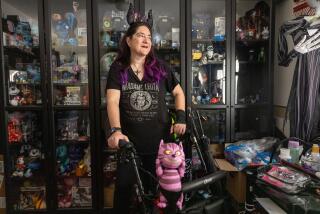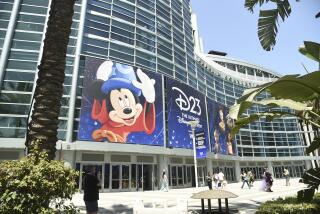Disney Agrees to Better Meet Needs of Deaf
- Share via
The Walt Disney Co. on Friday reached an agreement with the U.S. Department of Justice to provide interpreters and other assistance for the hearing impaired at its U.S. theme parks, including Disneyland.
The pact was a response to complaints brought against the entertainment giant by deaf consumers under the Americans with Disabilities Act (ADA), which guarantees the disabled equal access to public accommodations, including theme parks.
Disney agreed to incorporate sign-language interpreters, innovative captioning systems and other audiovisual aids into more than 100 rides, parades, attractions and shows at its four domestic theme parks.
Disney has agreed to have most of the improvements in place by the end of the year. The pact covers Disneyland in Anaheim and Walt Disney World, Epcot and Disney-MGM Studios near Orlando, Fla. The agreement was not an admission or wrongdoing, nor was the company fined by the Justice Department.
“[Disney] is combining its tradition of innovation with a commitment to ensuring that deaf and hard-of-hearing people can experience Disney’s magic,” said Deval Patrick, assistant attorney general for civil rights. “This is a great example of the public and private sectors working together to remove barriers to communication to all people.”
Advocates for deaf hailed the agreement as a watershed that would compel other theme parks and entertainment venues to improve their services to the hearing impaired.
“There is no doubt that other places are going to follow Disney’s lead,” said Coleen Ashly, outreach director for the Greater Los Angeles Council on Deafness (GLAD) in Ventura. “This is a significant action and a great day for the deaf community. I’m thrilled.”
Passed in 1990, the ADA prohibits discrimination against persons with disabilities. But it wasn’t until mid-1992 when the Justice Department adopted regulations enforcing the law that complaints against Disney began to roll in, according to agency sources.
“Disney had an extraordinary record for making its parks accessible to those in wheelchairs, so people with other disabilities expected more of Disneyland and Disney World,” said one official who did not want to be identified.
Shortly afterward, the Justice Department began negotiating with the entertainment giant to come with a series of steps the parks could take to put them in compliance with the ADA.
Technological innovation will be central to the effort. Disney has been experimenting with so called “reflective captioning” technology, which already is being tested at the Hall of Presidents attraction at Walt Disney World.
That process allows hearing impaired individuals to look through a hand-held plexiglass window at their seats, and view the dialogue of the audio-animatronic presidents without the text being visible to other patrons.
Disney spokesman Bill Warren said that process will be replicated in other attractions, such as Great Moments with Mr. Lincoln at the Anaheim park.
“This is going to raise the bar for the industry,” Warren said. “We are setting some new standards that we’re very excited about.”
In addition to new technologies, the parks also plan to provide regular interpreters at dialogue-heavy attractions such as the Jungle Cruise, as well as for selected performances of live stage shows, parades and special events.
The company also will provide interpreters to guests who request the service in advance. It will do outreach to hearing impaired patrons to inform them of available services such as interpreters, captioning and amplification devices. And it will train guest services employees about the special needs of the hearing impaired.
Disney declined to say how much the improvements would cost.
“A lot,” Warren said. “Obviously it’s expensive. But that’s not the issue.”
Disney isn’t the only entertainment company to be targeted by the Justice Department to improve accessibility for the hearing impaired.
In 1995, the agency reached a similar pact with Cineplex Odeon Corp. and Plitt Theatres, Inc. in which the theaters agreed to provide hearing-disabled patrons with assisted listening systems and other audiovisual aids.
Ironically, Disneyland has long been considered the local theme park most sensitive to the needs of the hearing impaired. Since 1980, Ashly said, the Anaheim park has hosted an annual event in which it opens the park to hearing-impaired patrons, providing interpreters, captions and other assistance for that particular day.
Other parks have emulated the practice. But Ashly says the ADA has encouraged people with hearing disabilities to become more militant and demand accommodation more than one day a year.
Leeanne Zirbel, a hearing-impaired employee of GLAD, said Disneyland can be a frustrating experience for deaf patrons, whose disability cuts them off from much of the Disney magic.
“This is awesome,” she said of Friday’s agreement. “This [action] is going to break down other barriers” for the hearing impaired.
Both Knott’s Berry Farm and Universal Studios Hollywood say they offer special headsets that amplify instruction and other recorded park messages for people with partial hearing losses.
For those with complete hearing loss, the parks offer written guidebooks. But the two Disney rivals have also developed other ways of accommodating the deaf.
At Universal Studios, for instance, deaf visitors can request a tour guide who knows sign language and will accompany the visitor throughout the park all day, free of charge. The arrangement is particularly useful on rides such as the Backlot Tram, a 45-minute narrated tour of Universal’s studios, said spokesman Eliot Sekuler.
Captions for the deaf appear on video screens such as the one used for the orientation to the park’s Backdraft attraction, said Sekuler, who added that deaf visitors are also eligible for a 20% discount.
“It’s been a priority for the park for a long time,” Sekuler said.
Knott’s Berry Farm occasionally schedules special events for the deaf, said spokeswoman Dana Hammontree. Once or twice a year, interpreters are stationed at all of the park’s attractions all day. The events are usually organized in cooperation with local deaf advocacy groups, Hammontree said.
On a daily basis, deaf visitors at Knott’s can request help from several park employees who are proficient in sign-language, Hammontree said.
Contributing to this reporter were Times staff writers James S. Granelli and Greg Miller.
More to Read
Sign up for Essential California
The most important California stories and recommendations in your inbox every morning.
You may occasionally receive promotional content from the Los Angeles Times.










